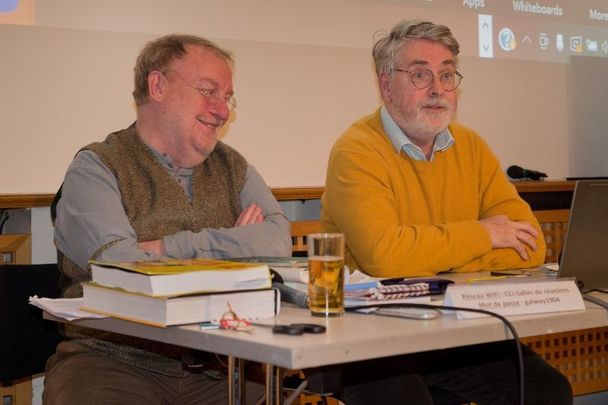After whirlwind preparations and Christmastide where, credit and Santy permitting, gratifications continued until the final festive evening of 2022, Ebenezer Scrooge and his “cold from within” are back, heralding continuing inflation and spiraling rents in Dublin and other cities around the world.
As usual, it’s on unholy January 1, coinciding with December’s bank statement and the post-festivities hangover, that pressure and ideas of resolution kicked in for many.
However, my niece recently reminded me that the original Roman calendar of Romulus (ca 738 BC) had only 10 months. During that 304-day calendar, in the clement climate of Rome, harvest was in December, not September. January and February were wiped off the chart and after December 31, the 10-month calendar only recommenced on March 1 i.e. Martius (Mars).
When I lived in Ireland, and other countries adhering to today’s most widely used Gregorian calendar, “New Year," midnight of December 31 till midnight of January 1, often had a rip off the band-aid effect and apart from feeble attempts at resolutions in early January, I usually forgot about New Year until the next one.
However, not so in France, where New Year wishes extend throughout the whole month of January. Here we write New Year not Christmas cards, and as long as you stick the cards in the postbox by January 31, you’ve done your job. Any card posted after that is a breach of French etiquette.
January in France is one huge Epiphany Bash. In homes, corporations, and campaign offices around the country, the Galette des Rois (The Kings’ Cake), accompanied by champagne and cider, is consumed as we elongatedly eat and sip into 2023. That event with its flakey, buttery pastry cake, stuffed with almond paste, celebrating the Epiphany, proves a challenge for “sober curious” attempting a dry January and the not-so-tough cookies striving to go sugar-free.
From podiums, France’s corporate and political leaders adopt king-like status as they deliver New Year wishes. They deliberate on the successes/failures of the past year and proffer prophecies. Predictions for 2023 were often so dismal that many events lost their former sound and laser light show pomp and glamour. Champagne was off the table; cider, its poorer galette cousin, became the 2023 exclusive Galette des Rois beverage for many.
Not so in my company, and bubbles dancing atop awaiting champagne-filled flutes were difficult to resist, especially as my dental crown was shaken when I bit into the galette’s lucky fève (charm). Like the barmbrack, it comes with this hidden bonus, and the “lucky” person selects a king or queen. I promptly swallowed my luck, I wasn’t up to crowing my corporate king amid the year’s pickings!
For the galette in homes with children, the youngest slips under the table and yells out the name of the person to receive each slice so the server can’t be accused of playing favorites. Amid the mounting suspense about winning the charm, you might spot a bulge in the “lucky for some” slice. I’ve sometimes fiddled with the slices to ensure children got the charm. “Bad education” in my French women friends’ bible which adheres to a “more prepare them for life type philosophy.” French children are reared with a mixture of Dickensian discipline, magically melded with French philosophers’ learn-your-own-mind leanings.
At the recent “Poetic New Year's Wishes, Cercle Littéraire Irlandais" (CLI) hybrid event on 15 January, H.E Niall Burgess, Ambassador of Ireland to France recited two poems that soothed us into the New Year: Brian Bilston's “2015: That was the year that was not” and “Begin” by Brendan Kennelly. Amazing poets, singers, and writers, including Liam Carson and Louise McMahon Zoomed in from Ireland.
In between Zoomers, in the Centre Culturel Irlandais (CCI) William Howard played "O'Carolan's Concerto" on his mandolin, Stephanie Nic Cárthaigh sang “An Raibh Tú ag an gCarraig?” ("Were You at the Rock?"), Jeff Rian’s original composition adapted words from Samuel Beckett’s “Molloy” to a tune by Hank Williams, and Julie McDonald, Desmond McGetrick (CLI President), and Trish Costello also read. Declan Mc Cavana, who emceed the event, read from “The Dead” and Senator Barry Ward, speaking from Ireland, closed the mellow, literary event.
As I bid farewell to our host, Nora Hickey M’Sichili, CCI director, ideas of persisting with draconian 2023 resolutions were behind me.
Just yesterday, tucking into a final galette, I raised my glass to the ancient Romans. March is a far more reasonable month for New Year, with its encouraging stretch in the day, making you inclined to go for a walk or to the gym after work, instead of running home to eat comfort food and curl into a mini Netflix hibernation until the pinging alarm announces another January or February day. And sure, those oft-gloomy 61-year beginning days were only admitted into the calendar, as a mere afterthought (albeit ca 700 BC).
January 22 also marked the Chinese New Year - “The Year of the Rabbit” and the rabbit sign are expected to usher in a softer period focused on self-reflection.
Enjoying beautiful words and music can also be a great way to Tóg go bog é. The mellifluous "O'Carolan's Concerto," that William Howard[1] played at the CLI event was by Turlough O'Carolan (1670 –1738). O'Carolan was a blind, itinerant harper, composer, and singer, aka 'the last of the bards.’ Howard explained the concerto was a response to a compositional challenge by Francesco Geminiani, the Italian violinist and composer, during his visit to Dublin. Italian baroque music was strongly in vogue throughout Europe at the time, and O'Carolan was known to draw inspiration from his contemporary Italian composers, combining the “bella vita” with Irish harp music.
*Patricia Killeen is the host of “Turning Points” on World Radio Paris.
[1] William Howard (from Maynooth University Dublin, currently teaches Teastas Eorpach na Gaeilge (TEG) Irish classes to students in the CCI Paris).
This article was submitted to the IrishCentral contributors network by a member of the global Irish community. To become an IrishCentral contributor click here.




Comments